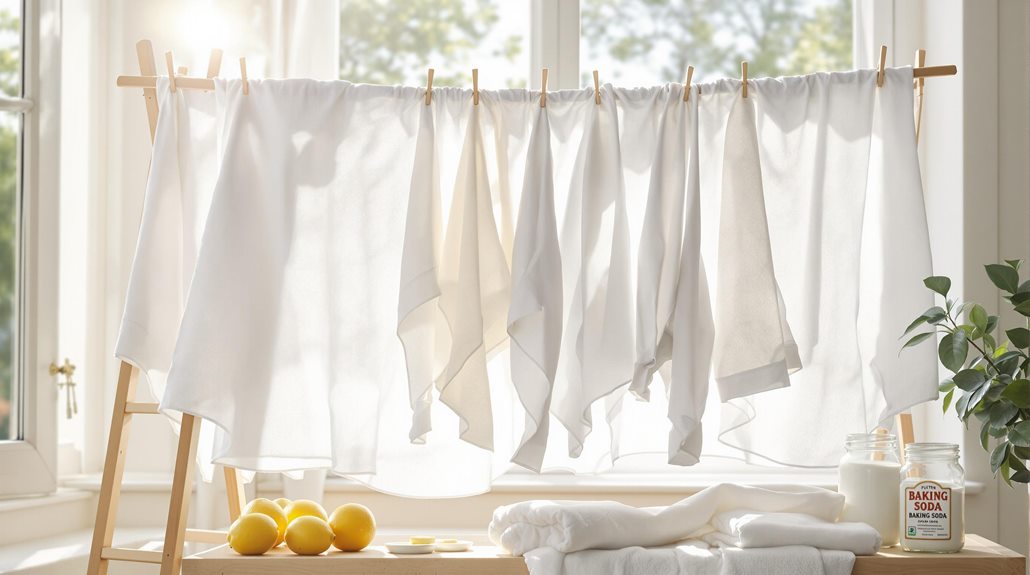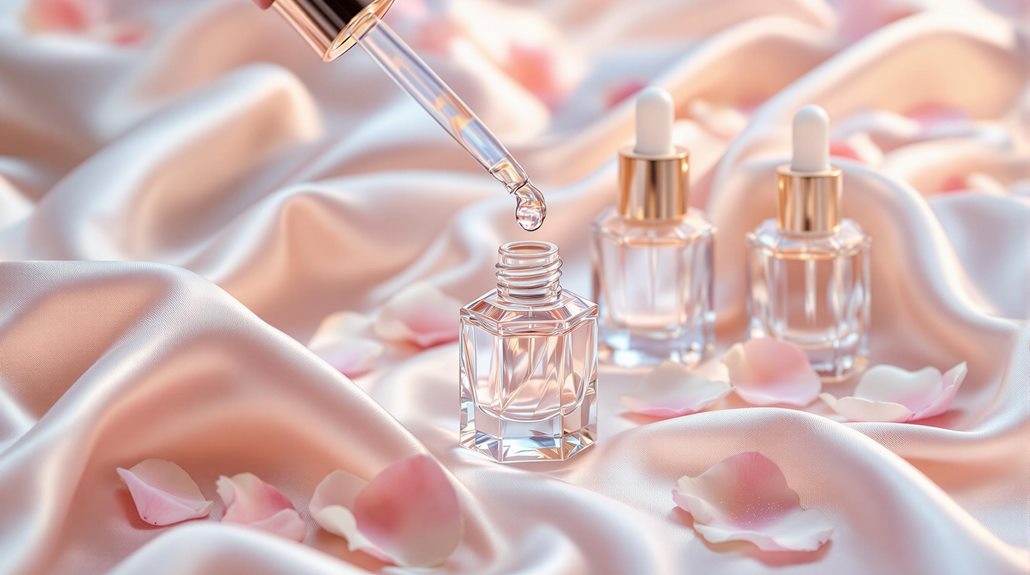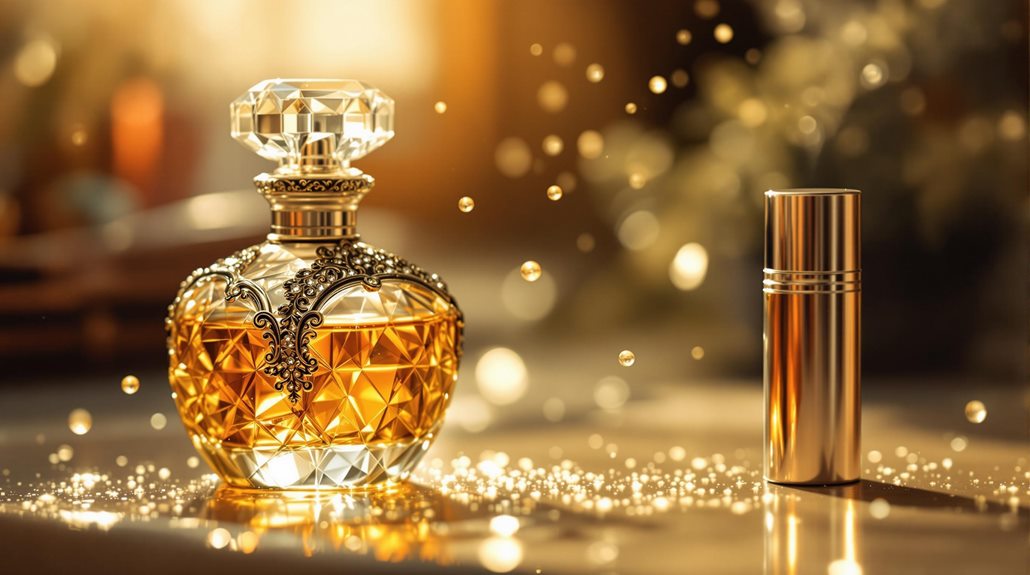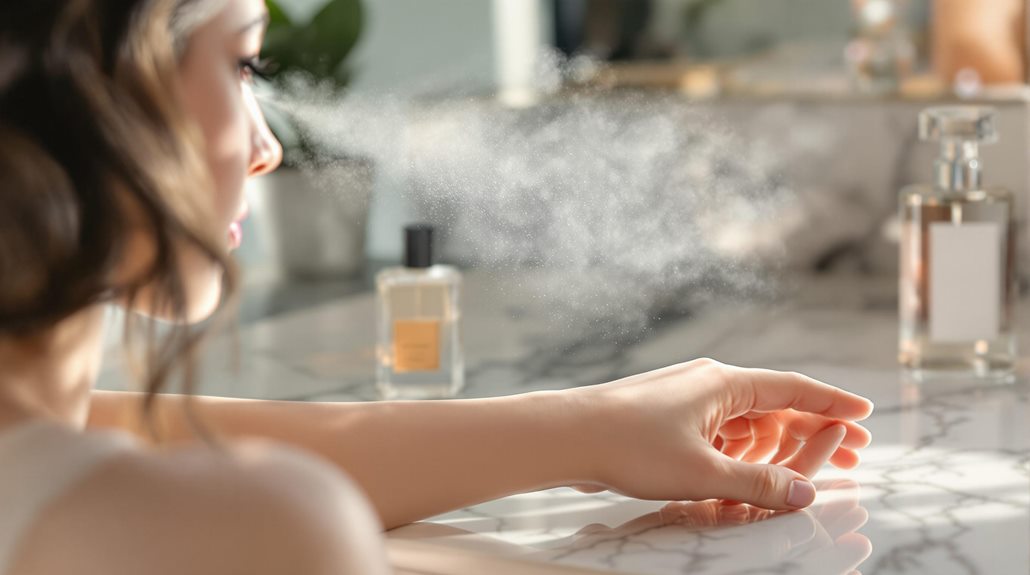Is Your Perfume Still Good? How Long Perfumes Last and Signs of Expiration
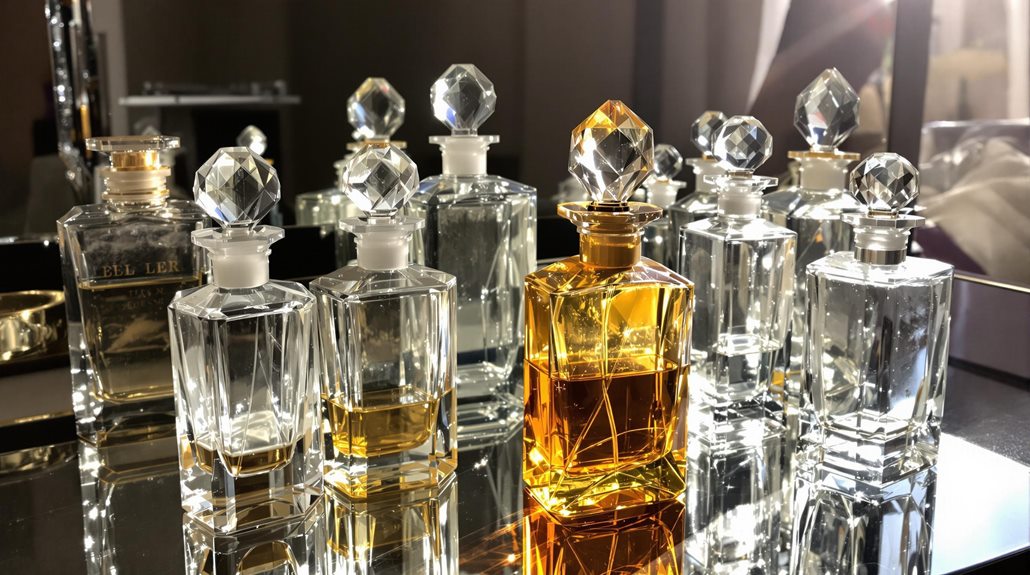
Your perfume's shelf life varies tremendously based on storage and handling. Unopened fragrances can last decades when stored properly, while opened bottles typically remain fresh for 3-5 years. You'll know your perfume has expired if you notice changes in the top notes, darkening color, separation of layers, or unusual cloudiness. Natural fragrances made with essential oils expire faster (2-5 years) than synthetic ones, which can last up to a decade. To maximize longevity, keep your perfumes in their original bottles, stored in cool, dark places away from sunlight and temperature fluctuations. Understanding more specific signs and storage tips can help preserve your favorite scents.
Understanding Perfume Shelf Life
Longevity matters when it comes to perfume, and understanding how long your favorite scent will last can save you from disappointment and waste. Your fragrance's shelf life typically ranges from 1-5 years, but several factors determine how long it'll stay good for use.
When you store your perfume properly, you can maximize its lifespan and maintain its original scent profile. An unopened bottle can last for years or even decades when kept in ideal conditions, but once you break that seal, you're starting a countdown of 3 months to 3 years before potential expiration signs appear.
Your perfume's concentration plays a vital role in how long it'll last. Higher concentrations and natural ingredients tend to expire more quickly, while synthetic fragrances often have longer shelf lives. To keep your perfume in good condition, you'll want to store your bottle in a cool, dark place away from direct sunlight and heat. Exposure to these elements can cause your fragrance to degrade faster, leading to noticeable changes in scent, color, and consistency that signal it's time to replace your bottle.
Common Signs of Expired Fragrances
Regularly checking your perfume for telltale signs of expiration can help you avoid wearing a fragrance that's past its prime. Even if stored properly in a dry and dark place, your Eau de Parfum won't last forever. While most fragrances can maintain their quality for several years, it's indispensable to recognize when your perfume has expired.
The most immediate indicator that your perfume has gone bad is a change in its top notes. If your once-beloved scent suddenly develops a sour, metallic, or plastic-like odor, it's time to say goodbye. You'll also want to examine the liquid itself, as expired fragrances often show visible changes in appearance.
- Color transformation from light yellow to dark brown due to oxidation
- Separation of the fragrance into distinct layers
- Unusual cloudiness or thickening of the liquid
Keep in mind that certain fragrance types have shorter shelf life than others. Those containing patchouli, citrus, or clean notes typically expire faster than woodsy or leather-based scents. Additionally, fragrances with lower alcohol content tend to deteriorate more rapidly.
Natural Versus Synthetic Perfumes
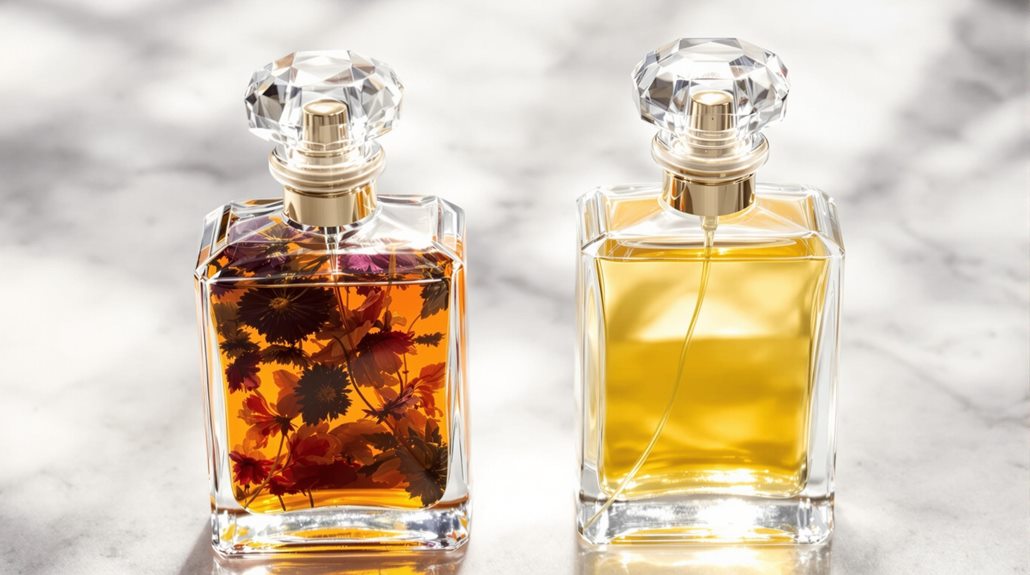
Understanding the difference between natural and synthetic perfumes helps explain why some fragrances last longer than others. If you've invested in natural perfumes made with essential oils and botanical extracts, you'll need to be aware that they typically last between 2-5 years, while synthetic fragrances can maintain their scent for up to a decade.
The reason for this significant difference lies in their composition. Natural fragrances are more vulnerable to degradation through exposure to light, heat, and oxygen. These environmental factors can alter their delicate scent profiles over time, requiring you to store them more carefully to preserve their quality. On the other hand, synthetic fragrances contain specially designed chemical compounds that resist these changes, making them more stable over time.
What gives synthetic perfumes their extended shelf life are the fixatives and stabilizing agents in their formulation. These ingredients help lock in the fragrance and prevent premature scent loss. While you might prefer the authentic and complex aromas of natural perfumes, you'll need to accept that they require more attention to storage and won't last as long as their synthetic counterparts.
Proper Storage Methods
Protecting your fragrance investment starts with proper storage techniques. Your perfumes need to be stored in a cool, dark place with consistent temperature to guarantee they last as long as possible. While it might be convenient to keep your perfume bottle in the bathroom, this location can actually accelerate degradation due to temperature fluctuations and humidity. Instead, consider storing your fragrances in their original packaging in a bedroom closet or dedicated storage area.
To maximize how long your perfume still remains fresh, follow these essential guidelines:
- Track your PAO (Period After Opening) dates by organizing your collection chronologically and noting the expiration date on each bottle
- Avoid decanting into smaller containers unless necessary, as increased oxygen exposure can diminish fragrance quality
- Consider refrigeration for long-term storage, but only if your refrigerator maintains a steady temperature and isn't opened frequently
Remember that proper storage can dramatically extend how long your fragrance lasts. Keep your perfumes in their original bottles whenever possible, as these containers are specifically designed to protect the formula from light and temperature changes that could compromise their integrity.
Quick Tests for Fragrance Quality
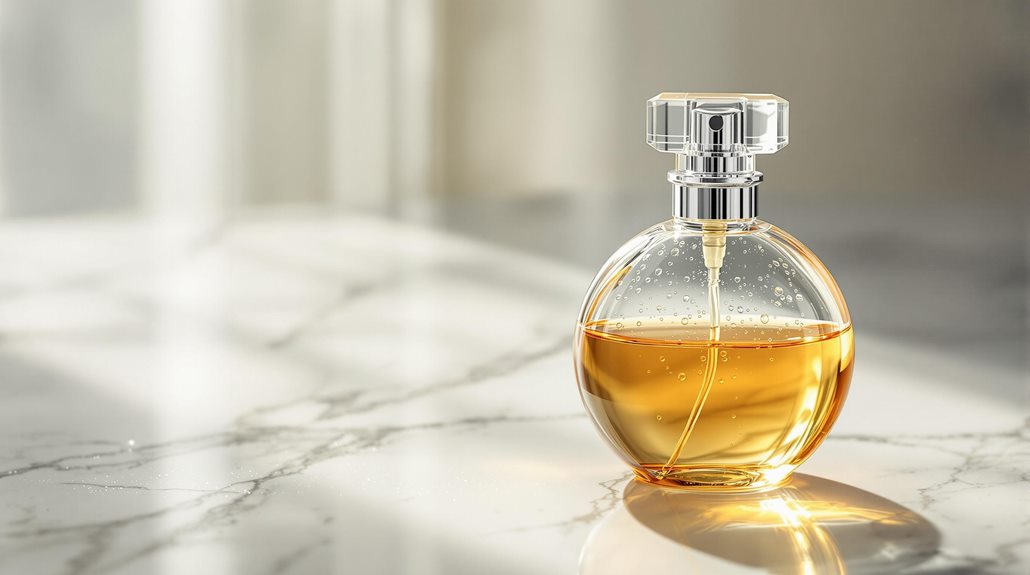
Even with ideal storage practices, you'll want to check your perfumes periodically for signs of deterioration. To test your perfume safely, start by examining its color - if it's darkened extensively or become cloudy, these are clear signs of expiration. Next, spray the fragrance on a piece of paper rather than directly on your skin to test it for signs of changes in its chemical composition.
When you're ready to evaluate the scent, it's probably best to test the perfume in the morning when your nose is fresh. Pay attention to how the fragrance develops over time. An expired perfume often loses its top notes quickly and may skip straight to the base notes. If you detect any unpleasant smell, such as a vinegar-like odor or rancid scent, dispose of the perfume immediately.
Before it's safe to apply an older fragrance to your skin, spray a small amount on your inner wrist and wait 24 hours to check for allergic reactions. If you experience any redness, itching, or irritation, discontinue use. When in doubt about a fragrance's quality, it's better to replace it than risk skin sensitivity.
Which Scents Expire Fastest
Fresh, crisp scents might delight your senses, but they're often the first to lose their magic. Perfumes featuring citrus notes, aldehydes, and light floral scents typically last only 2.5-5 years before they begin to deteriorate. If you're fond of fragrances containing lemon, orange, mint, or bergamot, you'll need to be particularly mindful of their shorter lifespan.
Your fragrance's composition plays an imperative role in its longevity. Oil-based fragrances, despite their initial intensity, tend to expire more quickly than their alcohol-based perfume counterparts. Without strong woodsy notes or resinous elements to anchor them, these lighter scents are more vulnerable to breakdown over time.
Citrus-dominant perfumes featuring lemon, orange, or bergamot as primary notes, fragrances heavy in aldehydes and light floral scents without substantial base notes, and oil-based perfumes lacking woody or resinous foundation notes are the top categories of fragrances that expire most rapidly.
If you've invested in any of these fragrance types, you'll want to use them more frequently and store them properly to get the most out of their shorter shelf life.
Unopened Perfume Longevity
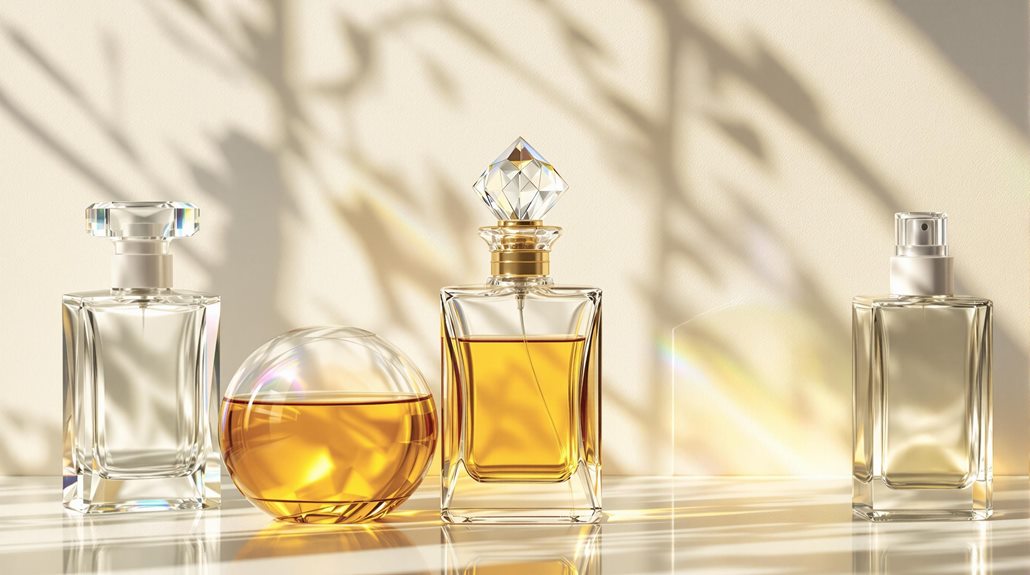
While certain fragrances may expire quickly once opened, an unopened bottle of perfume can maintain its quality for appreciably longer periods. You'll find that high-quality perfumes can even last a decade when stored properly, especially those with a high concentration of essential oils and less alcohol content.
If you're wondering how long does perfume last when unopened, the answer largely depends on how you store it. Your fragrances will last the longest when kept in a cool, dark place with consistent temperature. Unlike wine, perfumes don't get better with age, but they can last much longer when protected from environmental factors that speed up degradation.
To make your unopened perfumes last time after time, avoid exposing them to heat, direct sunlight, or frequent temperature changes. While some fragrances can last as long as ten years when unopened, it's crucial to check for signs of deterioration before using them, even if they've never been opened. Remember that even last years' unopened perfumes might show signs of expiration, so always inspect the color, scent, and consistency before first use.
Extending Your Perfume's Life
Preserving your perfume's longevity starts with proper storage habits and mindful handling. To keep your fragrance fresh for as long as possible, you'll need to store perfume in its original container and protect it from environmental factors that can degrade its quality. The best place to keep the perfume is in a bedroom drawer or closet, away from sunlight and fluctuating temperatures.
While many people display their fragrances on vanities or bathroom counters, storing fragrances properly means protecting them from heat, light, and humidity. The fridge is a good option for storing perfumes, especially during hot summer months, as consistent cool temperatures help maintain the scent's integrity.
Always keep bottles tightly sealed when not in use to prevent oxidation and evaporation. Handle bottles with clean, dry hands to avoid contaminating the sprayer mechanism. Store bottles upright and in their original packaging to provide additional protection from light and temperature changes.
When stored correctly, following these guidelines, you can considerably extend your perfume's lifespan and maintain its intended fragrance profile.
Dangerous Signs to Watch
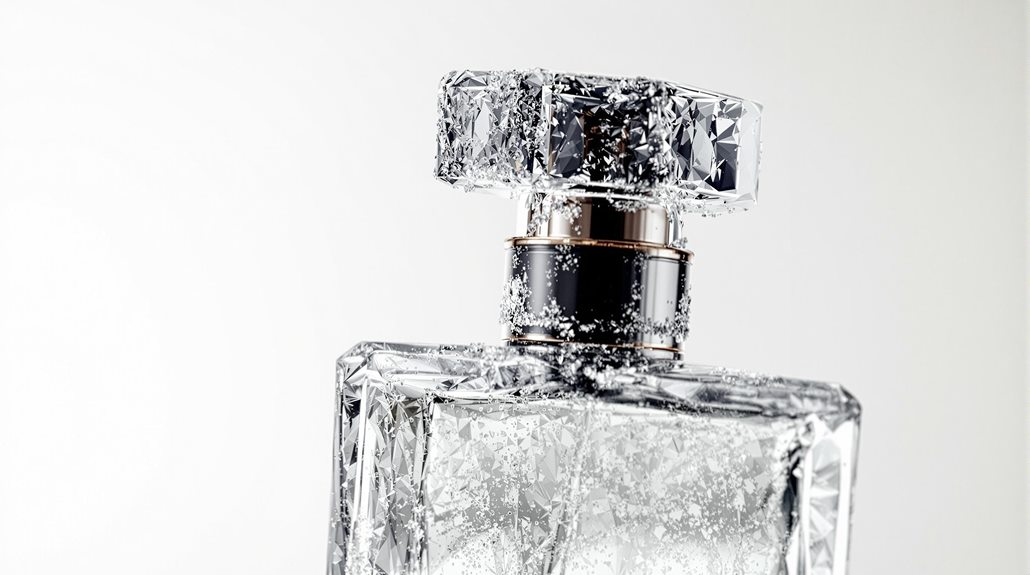
Even with proper storage practices, perfumes can develop dangerous qualities over time that warrant immediate disposal. When your perfume has gone bad, several warning signs indicate it's no longer safe to use. If you notice skin irritation or allergic reactions after application, your perfume is expired and could contain harmful compounds that have developed over time.
Pay close attention to how your fragrances expire - a vinegary, metallic, or chemical odor suggests oxidized molecules have formed, making the perfume unsafe. Even if your perfume is stored properly, watch for crystallization or separation in the bottle, as this indicates the breakdown of indispensable stabilizing ingredients. The alcohol inside your fragrance can deteriorate, leading to visible changes like darkening or discoloration of the liquid, which often signals the presence of irritating oxidation byproducts.
Most importantly, trust your nose. When perfumes go bad, they'll develop harsh, sour, or unpleasant scents that differ drastically from their original fragrance profile. These changes in Perfume And Storage conditions aren't just about diminished quality - they're warning signs that your perfume might be dangerous to use.
Safe Disposal of Old Fragrances
Once you've identified that your perfume has expired or gone bad, proper disposal becomes crucial for both safety and environmental reasons. Fragrances that might be expired can be tricky to dispose of, as exposure to air can upset the chemical balance, and evaporation of the alcohol can make them potentially hazardous. The way you handle your expired perfume matters tremendously for environmental safety.
Your local municipality likely offers special collection programs for fragrance disposal, and it is imperative to take advantage of these services. Before disposal, you'll want to check your area's specific regulations, as requirements can vary by location. Remember that air can also upset the fragrance's composition and accelerate the evaporation process, making proper disposal even more critical.
- Contact your local waste management facility to inquire about special collection programs for fragrances
- Separate perfume bottles for recycling if your municipality accepts them
- Never pour expired perfumes down the drain or throw them directly into regular trash bins, as this can harm the environment
Conclusion
Your perfume's longevity depends on proper storage and handling. While most fragrances last 3-5 years, you'll extend their life by keeping them away from heat, light, and humidity. If you notice changes in color, scent, or texture, it's time to replace your perfume. Trust your senses and don't use fragrances that smell off or irritate your skin. Store them correctly, and you'll enjoy your favorite scents longer.

